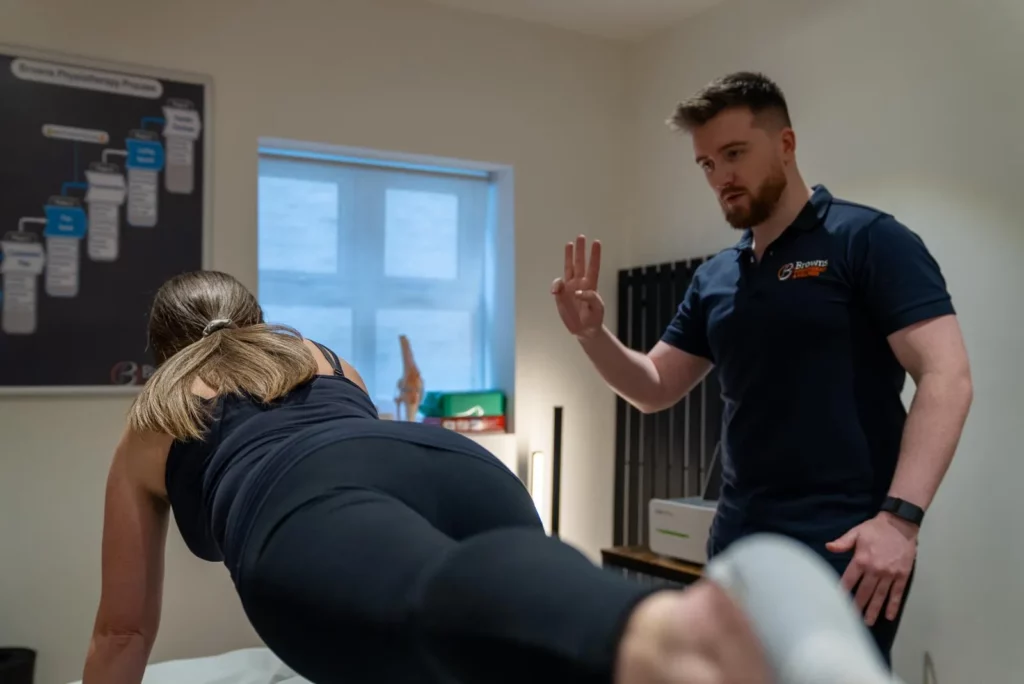Award Winning Physiotherapy Clinics across Cheshire & Staffordshire.
Brown’s Physiotherapy is an award winning & leading provider of Physiotherapy in Congleton, Macclesfield & Stoke-on Trent. Live with less pain and get back to feeling great again.
Specialists in Helping Adults Aged 40+ Become More Active, Pain Free & independent
Browns Physiotherapy is used by hundreds of people in the Congleton, Macclesfield & Stoke-on Trent area just like you. We’re the fastest growing Physiotherapy Clinic for men and women in their 40’s, 50’s, and 60’s and above who want to get rid of pain, stay active, healthy and independant.
If you’re seeking relief from pain and injury, our Congleton, Macclesfield and Stoke-on-Trent physiotherapy clinics can help. Book an appointment to get on the road to recovery.
What Our Customers Say
Donal Brown
Trusted health expert who helps people aged 40+ on a daily basis. His greatest joy is seeing his clients return to the activities that they once enjoyed.
Conditions we treat at Browns Physio
EXCELLENTTrustindex verifies that the original source of the review is Google. Great place to go and very helpful! Charlie was brilliant, and has possibly the pointiest elbows in stoke but the pain has now gone 🤘🏼Posted onTrustindex verifies that the original source of the review is Google. I would like to share my gratitude and happiness with this post. On February 28, 2024, I underwent surgery on my right knee (ACL reconstruction). I was recovering well. However, on January 28 of this year, exactly 11 months after my surgery, I suffered another knee injury, this time in my left knee. I suffered a partial rupture of the ACL and the anterior and posterior horns of the medial meniscus. I first contacted Browns Physiotherapy in early March and was very well attended to by Jenna. In total, I had 7 physiotherapy sessions, with 1-week intervals between each one, and today I can say that I am very satisfied with the work done by Charlie. Thank you very much, Charlie! Know that you are an excellent professional! Before starting treatment with Charlie, I was unable to run due to the pain caused by the menisci, but today I run normally and better than before. Regarding BROWNS PHYSIOTHERAPY, I highly recommend it.Posted onTrustindex verifies that the original source of the review is Google. I have had shoulder pain for almost 7 years. I have needed to have cervical spinal surgery and both prior to this and after this have sought numerous treatments non of which have resolved my pain. I decided to try one more time and saw Dan, he took a comprehensive history and for the first time in 7 years I felt there was improvement to be had. Following a number of appointments I now suffer much less pain and importantly feel confident in continuing with the exercise plan as these have been explained fully to me. I would recommend Dan at Browns physio therapy for anyone experiencing this sort of pain.Posted onTrustindex verifies that the original source of the review is Google. I cannot recommend Charlie at Browns enough. I have struggled with back pain for a long time but it became severe. Charlie did a full assessment and recommended 6 sessions of treatment to start with. I have been very impressed by how hands on the treatment has been. Along with the exercises and advice given to me, Charlie has been very professional and also very pleasant to chat to. I really felt like he really listened to me. I am now able to say my back is feeling a million times better thanks to Browns.Posted onTrustindex verifies that the original source of the review is Google. My back pain was debilitating before I went to see Browns. Now I’m back playing golf 4 days a week and feel great! From the first phone call to the assessment to the plan they gave me from the initial session, I was delighted with how good these guys were. Having been to loads of physio before, I can see why Browns are known as the are the best physios in Stoke.Posted onTrustindex verifies that the original source of the review is Google. Great service. Very professional and Dan did a great hobPosted onTrustindex verifies that the original source of the review is Google. I went to this place for a wrist pain and after the massage, I didn’t feel any immediate change. However, the next day, after dealing with the pain for eight days, it finally can feel a big relief. I’m still following Charlie’s instructions and won’t strain the muscle until it’s fully recovered. Thank you very much. I definitely recommend this place.Posted onTrustindex verifies that the original source of the review is Google. I have been receiving treatment for my back and shoulder from Dan Cooper I found him very polite and knowledgeable my back is much improved my shoulder is still a little bit sore but getting better each day. I will definitely use Browns physiotherapy again Thank you Denise BennettPosted onTrustindex verifies that the original source of the review is Google. 8 or so weeks ago I rolled my ankle over a curb and tore 2 ligaments in my ankle and my shin muscle. I went to See Daniel Cooper who did an amazing job getting me back to near full fitness in no time at all, and ready for a cricket tour of Portugal! Could not recommend enough.
Your Questions Answered
What is physiotherapy?
The process typically begins with a thorough assessment of the patient’s condition, including a review of medical history and a physical examination. Based on the assessment, the physiotherapist develops a personalised treatment plan that may involve hands-on techniques, therapeutic exercises, and other modalities such as ultrasound, heat, or electrical stimulation.
Overall, physiotherapy aims to optimize the physical functioning of individuals and enhance their quality of life through a holistic and patient-centered approach.
How often should I go to physiotherapy?
The frequency of physiotherapy sessions can vary depending on several factors, including the nature and severity of the condition being treated, the individual’s response to treatment, and the goals of therapy. Typically, the frequency of physiotherapy sessions is determined by the physiotherapist in collaboration with the patient.
Can physiotherapy help sciatica?
Yes, physiotherapy can be beneficial in the management and treatment of sciatica. Sciatica refers to pain that radiates along the sciatic nerve, which typically runs down the back of the leg. It is often caused by compression or irritation of the sciatic nerve, commonly due to a herniated disc, spinal stenosis, or other conditions affecting the spine.
Physiotherapy interventions for sciatica aim to relieve pain, improve mobility, and address the underlying causes.
How quickly does physiotherapy help?
The speed at which physiotherapy produces noticeable results can vary widely depending on several factors, including the nature and severity of the condition being treated, the individual’s overall health, their adherence to the prescribed exercises and lifestyle changes, and the specific goals of the physiotherapy treatment.










